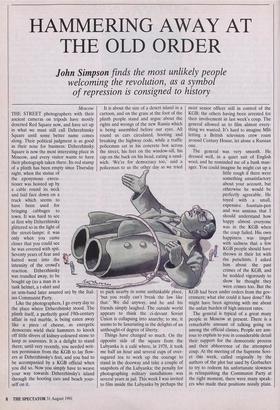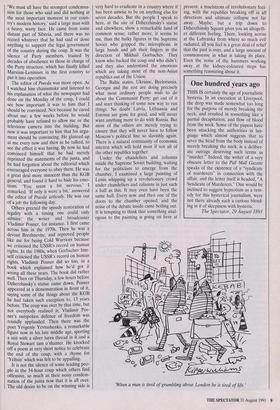HAMMERING AWAY AT THE OLD ORDER
John Simpson finds the most unlikely people
welcoming the revolution, as a symbol of repression is consigned to history
tank helmet, a t-shirt and an arm-band later assured us) by the Ital- ian Communist Party.
Like the photographers, I go every day to the place where Dzherzhinsky stood. The plinth itself, a perfectly good 19th-century affair in red marble, is being eaten away like a piece of cheese, as energetic democrats wield their hammers to knock off little slivers of kidney-coloured stone to keep as souvenirs. It is a delight to stand there; until very recently, you needed writ- ten permission from the KGB to lay flow- ers at Dzherzhinsky's feet, and you had to be accompanied by a KGB official when you did so. Now you simply have to weave your way towards Dzherzhinsky's island through the hooting cars and beach your- self on it. It is about the size of a desert island in a cartoon, and on the grass at the foot of the plinth people stand and argue about the rights and wrongs of the new Russia which is being assembled before our eyes. All round us cars circulated, hooting and breaking the highway code, while a traffic policeman sat in his concrete box across the street, his feet on the window-sill, his cap on the back on his head, eating a sand- wich. 'We're for democracy too,' said a policeman to us the other day as we tried to park nearby in some unthinkable place, `but you really can't break the law like that.' We did anyway, and he and his friends simply laughed. The outside world appears to think the ci-devant Soviet Union is collapsing into anarchy; to me, it seems to be luxuriating in the delights of an unthought-of degree of liberty.
Things have changed so much. On the opposite side of the square from the Lubyanka is a café where, in 1978, it took me half an hour and several cups of over- sugared tea to work up the courage to stand in the doorway and take a couple of snapshots of the Lubyanka; the penalty for photographing military installations was several years in jail. This week I was invited to film inside the Lubyanka by perhaps the most senior officer still in control of the KGB; the others having been arrested for their involvement in last week's coup. The general allowed us to film almost every- thing we wanted. It's hard to imagine MI6 letting a British television crew roam around Century House, let alone a Russian one.
The general is typical of a great many people in Moscow at present. There is a remarkable amount of talking going on among the official classes. People are anx- ious to explain to you in considerable detail their support for the democratic process and their abhorrence of the attempted coup. At the meeting of the Supreme Sovi- et this week, called originally by the authors of the plot but used by Gorbachev to try to redeem his unfortunate slowness in relinquishing the Communist Party at the right moment, there were many speak- ers who made their positions noisily plain. `We must all have the strongest condemna- tion for those who said and did nothing at the most important moment in our coun- try's modern history,' said a large man with a heavy, warty face. He came from some distant part of Siberia, and there was no record whatever that he had said or done anything to support the legal government of the country during the coup. It was the silence of Party members, trained by decades of obedience to those in charge of the Party structure, which has finally killed Marxism-Leninism in the first country to put it into operation.
The editor of Pravda was more open. As I watched him chainsmoke and listened to his explanation of what the newspaper had done on the Monday of the coup, I could see how important it was to him that I should be convinced. Not because he cared about me: a few weeks before he would probably have refused to allow me or the television camera into the building. But now it was important to him that his argu- ment should be convincing. He glanced up at me every now and then as he talked, to see the effect it was having. By now he had convinced himself that he had merely reprinted the statements of the junta, and he had forgotten about the editorial which encouraged everyone to obey them. He was a great deal more innocent than the KGB general, and found it hard to hide his emo- tions. 'You seem a bit nervous,' I remarked. 'If only it were a bit,' answered the editor of Pravda artlessly. He was out of a job the following day. Others greeted the speedy restoration of legality with a timing one could only admire: the writer and broadcaster Vladimir Posner, for instance. I first came across him in the 1970s. Then he was a devout Brezhnevite, and reproved people like me for being Cold Warriors because we criticised the USSR's record on human rights. In the 1980s, when Gorbachev him- self criticised the USSR's record on human rights, Vladimir Posner did so too, in a book which explained how he'd got it wrong all these years. The book did rather well. Then on Thursday, a few hours before Dzherzhinsky's statue came down, Posner appeared at a demonstration in front of it, saying some of the things about the KGB he had taken such exception to, 13 years before. The coup was over by that time, but not everybody realised it; Vladimir Pos- ner's outspoken defence of freedom was roundly applauded. Then there was the poet Yevgeniy Yevtushenko, a remarkable figure now in his late middle age, sporting a suit with a silver lurex thread in it and a Royal Stewart tam o'shanter. He knocked off a poem at very short notice to celebrate the end of the coup, with a rhyme for `Yeltsin' which was felt to be appalling.
It is not the silence of some leading, peo- ple in the 54-hour coup which others find offensive, so much as their noisy condem- nation of the junta now that it is all over. The old desire to be on the winning side is very hard to eradicate in a country where it has been unwise to be on anything else for seven decades. But the people I speak to here, at the site of Dzherzhinsky's statue and elsewhere, show a remarkable fund of common sense; rather more, it seems to me, than the bulky figures in the Supreme Soviet who gripped the microphone in large hands and jab their fingers in the direction of Mikhail Gorbachev. They know who backed the coup and who didn't; and they also understand the emotions which are taking most of the non-Asian republics out of the Union.
The Baltic states, Ukraine, Byelorussia, Georgia and the rest are doing precisely what most ordinary people wish to do about the Communist Party: get out of it and start thinking of some new way to run things. No doubt Latvia, Lithuania and Estonia are gone for good, and will never want anything more to do with Russia. But most of the others are merely trying to ensure that they will never have to follow Moscow's political line so slavishly again. There is a natural community of economic interest which will hold most if not all of the other republics together.
Under the chandeliers and columns inside the Supreme Soviet building, waiting for the politicians to emerge from the chamber, I examined a large painting of Lenin whipping up a revolutionary crowd under chandeliers and columns in just such a hall as this. It may even have been the same hall. Every now and then one of the doors to the chamber opened, and the noise of the debate inside came boiling out. It is tempting to think that something anal- ogous to the painting is going on here at `When a man is tired of grumbling about London he is tired of life.' present: a maelstrom of revolutionary feel- ing, with the republics breaking off in all directions and ultimate collapse not far away. Maybe; but a trip down to Dzherzhinsky Square gives you an altogeth- er different feeling. There, looking across at the Lubyanka from where so much evil radiated, all you feel is a great deal of relief that the past is over, and a large amount of commonsense in what is taking its place. Even the noise of the hammers working away at the kidney-coloured steps has something reassuring about it.











































 Previous page
Previous page